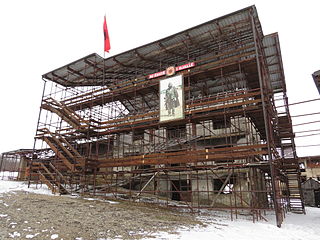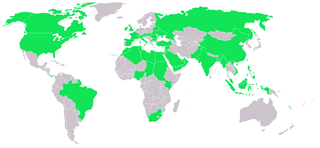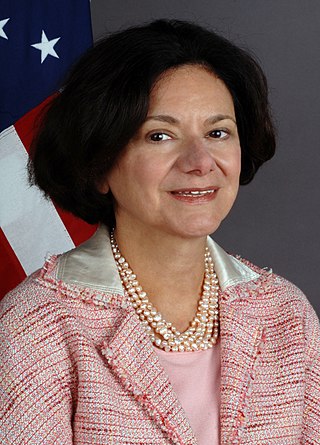Related Research Articles

The State Union of Serbia and Montenegro or simply Serbia and Montenegro, known until 2003 as the Federal Republic of Yugoslavia, FR Yugoslavia (FRY) or simply Yugoslavia, was a country in Southeast Europe located in the Balkans that existed from 1992 to 2006, following the breakup of the Socialist Federal Republic of Yugoslavia. The state was founded on 27 April 1992 as a federation comprising the Republic of Serbia and the Republic of Montenegro. In February 2003, it was transformed from a federal republic to a political union until Montenegro seceded from the union in June 2006, leading to the full independence of both Serbia and Montenegro.

The Oil-for-Food Programme (OIP) was established by the United Nations in 1995 to allow Iraq to sell oil on the world market in exchange for food, medicine, and other humanitarian needs for ordinary Iraqi citizens without allowing Iraq to boost its military capabilities.
The history of Kosovo dates back to pre-historic times when the Starčevo culture, Vinča culture, Bubanj-Hum culture, and Baden culture were active in the region. Since then, many archaeological sites have been discovered due to the abundance of natural resources which gave way to the development of life.
Claudia Rosett was an American author and journalist. An editorial board member of The Wall Street Journal, she was the only print journalist to witness the Tiananmen Square massacre and later broke the United Nations’ Oil for Food scandal, the largest public fraud in history. After her Journal career in Hong Kong, Moscow, and New York, she wrote a foreign affairs column for Forbes, blogged for PJ Media, and made regular appearances on national television and radio, including Fox Business. She also worked for the Independent Women's Forum and the London Center for Policy Research, and served as an adjunct fellow at the Hudson Institute.

Janine di Giovanni is an author, journalist, and war correspondent currently serving as the Executive Director of The Reckoning Project. She is a senior fellow at Yale University's Jackson Institute for Global Affairs, a non-resident Fellow at The New America Foundation and the Geneva Center for Security Policy in International Security and a life member of the Council on Foreign Relations. She was named a 2019 Guggenheim Fellow, and in 2020, the American Academy of Arts and Letters awarded her the Blake-Dodd nonfiction prize for her lifetime body of work. She has contributed to The Times, Vanity Fair, Granta, The New York Times, and The Guardian.

Adem Jashari was one of the founders of the Kosovo Liberation Army (KLA), a Kosovo Albanian separatist militia which fought for the secession of Kosovo from the Federal Republic of Yugoslavia during the 1990s.

Vuk Grgurević Branković was a Serbian nobleman who was the titular despot of Serbia from 1471 until his death in 1485. He inherited the title of despot from King Matthias Corvinus, and ruled most of present-day Vojvodina, under the overlordship of the Kingdom of Hungary. Known in Serbian epic poetry for his bravery and heroism, he is called Vuk the Fiery Dragon, Vuk the Dragon-Despot, or simply the Dragon; he commanded the Hungarian army in several of its battles against the Ottomans. He is considered the founder of the Grgeteg Monastery.

Kosovo Serbs are one of the ethnic groups of Kosovo and they form the largest ethnic minority community in Kosovo (5–6%). The precise number of Kosovo Serbs is difficult to determine as they have boycotted national censuses. However, it is estimated that there are about 95,000 of them, nearly half of whom live in North Kosovo. Other Kosovo Serb communities live in the Southern municipalities of Kosovo.
Dušan T. Bataković was a Serbian historian and diplomat. His specialty was modern and contemporary Serbian and Balkan history as well as French-Serbian relations. The last post he held was that of Director of the Institute for Balkan Studies at the Serbian Academy of Sciences and Arts.

The Attack on Prekaz, also known as the Prekaz massacre, was an operation led by the Special Anti-Terrorism Unit of Serbia which lasted from 5 to 7 March 1998, whose goal was to eliminate Kosovo Liberation Army (KLA) suspects and their families. During the operation, KLA leader Adem Jashari and his brother Hamëz were killed, along with nearly 60 other family members.

North Mitrovica or North Kosovska Mitrovica, is a town and municipality located in Mitrovica District in Kosovo. As of 2015, it has a population of 29,460 inhabitants. It covers an area of 11 km2 (4 sq mi).

Meri Helena Ranta is a Finnish forensic dentist. She became well known as a result of her contributions to several international forensic investigations of conflict situations, such as those in Kosovo. She testified at the trial of former Yugoslav president Slobodan Milošević after her forensic work in the Kosovo village of Račak. She was also part of the investigation of the victims of the sinking of MS Estonia.

United Nations Security Council resolution 1538, adopted unanimously on 21 April 2004, after expressing concern about the administration and management of the Oil-for-Food Programme in Iraq, the council ordered an inquiry to investigate the matter.

Rosemary Anne DiCarlo is an American diplomat who has served as United Nations Under-Secretary-General for Political and Peacebuilding Affairs since May 2018. She previously served as acting United States Ambassador to the United Nations following the resignation of Susan Rice to become the National Security Advisor.

Agnès Callamard is a French human rights activist who is the Secretary General of Amnesty International. She was previously the Special Rapporteur on extrajudicial, summary, or arbitrary executions appointed by the United Nations Human Rights Council, and the former Director of the Columbia University Global Freedom of Expression project.
Kosovo is the birthplace of the Albanian nationalist movement which emerged as a response to the Eastern Crisis of 1878. In the immediate aftermath of the Russo-Ottoman war, the Congress of Berlin proposed partitioning Ottoman Albanian inhabited lands in the Balkans among neighbouring countries. The League of Prizren was formed by Albanians to resist those impositions. For Albanians those events have made Kosovo an important place regarding the emergence of Albanian nationalism. During the remainder of the late Ottoman period various disagreements between Albanian nationalists and the Ottoman Empire over socio-cultural rights culminated in two revolts within Kosovo and adjacent areas. The Balkan Wars (1912–13) ending with Ottoman defeat, Serbian and later Yugoslav sovereignty over the area generated an Albanian nationalism that has become distinct to Kosovo stressing Albanian language, culture, and identity within the context of secession from Serbia. Pan-Albanian sentiments are also present and historically have been achieved only once when part of Kosovo was united by Italian Axis forces to their protectorate of Albania during the Second World War.

Haim Estreya Ovadya was a Jewish partisan from Bitola who joined the Yugoslav Partisans after the German invasion of Yugoslavia in 1941 during World War II. She was posthumously proclaimed People's Hero of Yugoslavia.
Catherine M. Croft is a United States Department of State official who has served as a special advisor for Ukraine both in the State Department and on the United States National Security Council. Croft testified in closed-door hearings before the House Intelligence, Oversight and Foreign Affairs committees in October 2019.
Joanikije of Devič, archaically also Janićije (Јанићије) was a 15th-century Serbian Orthodox saint.

Rita Izsák-Ndiaye is a human rights expert and former Hungarian diplomat. She has worked on human, minority and youth rights in various NGOs, the Hungarian Government and with international organizations. She served as the United Nations Special Rapporteur on minority issues between 2011 and 2017, as well as member and Rapporteur of the UN Committee on the Elimination of Racial Discrimination between 2018-2022. In 2021 and 2022, she was the Personal Representative of the OSCE Chairperson-in-Office on Children and Security. As of autumn 2022, she is Senior Adviser on Anti-Racism at UNDP.
References
- ↑ Di Lellio, Anna (2005). "Empire Life as a Swamp". Transitions. XLV (1): 61–78.
- ↑ "Kosovo journalists under threat". Representative on Freedom of the Media. OSCE. 2002-06-13.
- ↑ Tran, Mark (2002-09-11). "Anna Di Lellio: A UN administrator in Kosovo whose husband was at work in the World Trade Centre". The Guardian.
- ↑ Independent Inquiry Committee (September 24, 2004). "Statement for the Press". Archived from the original on September 19, 2006.
- ↑ Bataković, Dušan T. (2011). Minorities in the Balkans: state policy and interethnic relations (1804 - 2004). Balkanološki institut SANU. p. 268. ISBN 978-8-671-79068-0.
- ↑ "Zašto voliš ANU, a ne voliš SANU? - Društvo - Dnevni list Danas" (in Serbian). 2017-03-04. Retrieved 2025-01-06.